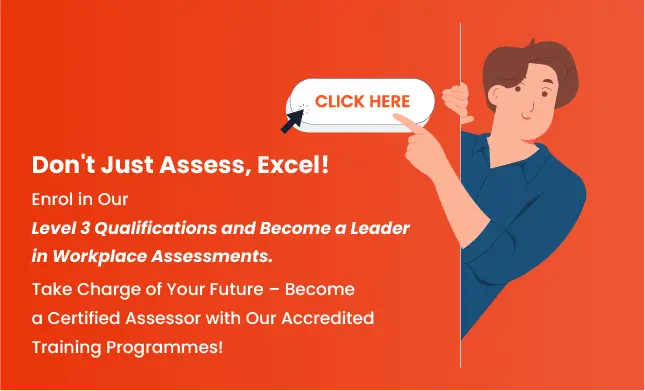Competence-based assessment (CBA) is a systematic approach to assess whether learners meet the standards required to perform a job in a real workplace setting. It is a process where a learner’s practical skills and abilities are assessed based on a specific competency, highlighting their proficiency in that area.
This assessment is mandatory for specific practical qualifications accredited by universities, awarding organisations, or sector-specific bodies in the UK. These qualifications are aligned with occupational standards, and assessments are conducted through practical demonstrations against defined core competencies, producing work-based evidence. Assessments in competence-based work settings align with job-specific sector and industry requirements, ensuring that the competencies needed for a particular role or profession are relevant and meet established standards, thereby guaranteeing success.
CBE Assessments = Assured Success

What is Competence-Based Work Environments?
A competency-based work environment is an actual work arrangement where the learner demonstrates their ability to perform job-related tasks and skills are assessed against the practices they perform on the job. In such environments, the emphasis is on the practical application of skills and knowledge aligned with actual workplace expectations.
Sectors that are under Competence-Based Environments
Some specific sectors and fields are required to meet occupational standards, and learners’ competency must be assessed in the workplace. Below is a list of a few sectors. It is by no means exhaustive, but occupations requiring this type of assessment cover:
| Sectors | Competency in Work Enviroment |
|---|---|
| Health and Social Care | Ensures individuals can identify, manage, and mitigate workplace risks. |
| Construction | Focuses on skill-based assessments for building, repair, and maintenance tasks. |
| Retail | Customer service and operational efficiency in a fast-paced environment are assessed. |
| Early Years Education | Learners are assessed on their competency in fostering child development and adhering to educational guidelines. |
| Engineering | Ensures learner is competent with the safety and functionality of systems and structures. |
| Music | Learners are assessed on their performance based on the standards of qualified assessors. |
| Performing Arts | The learner's adaptability and professionalism are assessed in acting, improvisation, or stage presence. |
| Driving Instruction | Ensures learners know traffic laws and regulations and communicate clearly and effectively on the road. |
| Hairdressing and Beauty Therapy | Learners are evaluated on their practical skills and ability to meet industry grooming standards. |
| Hospitality | Competencies such as soft skills in guest relations, food service, event management, and conflict resolution are being assessed. |
Why Assessment is Required in a Competence-Based Environment?
Competence assessments evaluate employees’ ability to perform tasks based on predefined standards. It is required to measure how well an individual applies specific skills or knowledge, focusing on real-world application rather than memorisation.
Characteristics of assessments in competence-based work environments include:
- To Validate Skills: Evaluate how well an individual can perform tasks relevant to their job, reflecting their actual capabilities in a practical context.
- Focus on Skill Application: Ensures learners can develop transferable skills, such as critical thinking, problem-solving, and effective communication, that mirror real-world challenges.
- Job Competency: Confirms that learners have the required job skills against specified performance standards, ensuring alignment with organisational objectives.
- Continuous Learning and Development: The learner is refining the skills through continuous practice and feedback. Areas that need improvement are pointed out to ensure complete competence.
How is assessment done in such environment?
There are multiple methods to assess the learner’s competency in real-life work settings.
- Direct Observation: Direct observation of the learner’s performance in their workplace or simulated environment, ensuring their skills and behaviours meet the criteria. The observation can be in a live session or a recorded format.
- Professional Discussions: Structured one-on-one professional discussions are conducted. This method verifies learners’ skills, knowledge and understanding related to specific competencies.
- Work Products:Collection of evidence such as reports, project work, or logs demonstrating competence over time. This also involves assessing tangible work the learner produces as part of their job or training.
- Questioning the learner: These questions can be oral or written or can be both, where role-specific questions are asked to fill gaps in evidence or confirm understanding of a topic. It is to evaluate skills, understanding, and ability to apply concepts related to the competency.
- Peer or Self-Assessments: Encouraging learners to reflect on their work or provide constructive feedback on their peers’ work to foster critical evaluation skills.

Which course is required to assess occupational competence at work and why?
For practical qualifications in the UK, which require competent work placements for assessment, the Level 3 Award in Assessing Competence in the Work Environment is one of the best-suited qualifications. This award is designed specifically for individuals responsible for assessing learners’ occupational competence in real workplace settings. It focuses on evaluating practical skills, knowledge, and behaviours through methods such as direct observation, professional discussions, and the review of workplace evidence.
Unlike the full-time assessor qualifications, the Level 3 Certificate in Assessing Vocational Achievement (CAVA), this award concentrates exclusively on work-based assessments and does not cover classroom-based or theoretical components. It is particularly beneficial for assessors working with apprentices, trainees, or employees in roles that demand hands-on performance aligned with occupational standards.
By equipping assessors with the skills to conduct reliable and valid assessments, this qualification supports the development of learners while ensuring that industry and regulatory benchmarks are consistently met.
Who should take this course?
This Level 3 Assessor Qualification is suitable for individuals who are:
- Workplace trainers or assessors evaluate apprentices, trainees, or employees.
- Responsible for ensuring that workplace performance meets industry benchmarks and organisational goals.

What if my job role does not include any practical aspect?
Unlike broader assessor qualifications, this course does not cover classroom-based or theory assessments. If your job does not involve hands-on practical skills, you can sign up for the Level 3 Award in Assessing Vocationally Related Achievement (AVRA) qualification. This qualification is designed for learners who want to be the assessor in educational or other vocational-related environments, where pupils are assessed on the base of knowledge, skills and understanding of the subject.
Conclusion
In a competency-based work environment, learners are assessed on their ability to demonstrate specific skills and behaviours aligned with job roles and industry standards. This approach prioritises measurable performance and practical application, ensuring readiness for real-world challenges. Assessment plays a crucial role in verifying that learners possess the required competencies to perform their tasks with precision and consistency.




